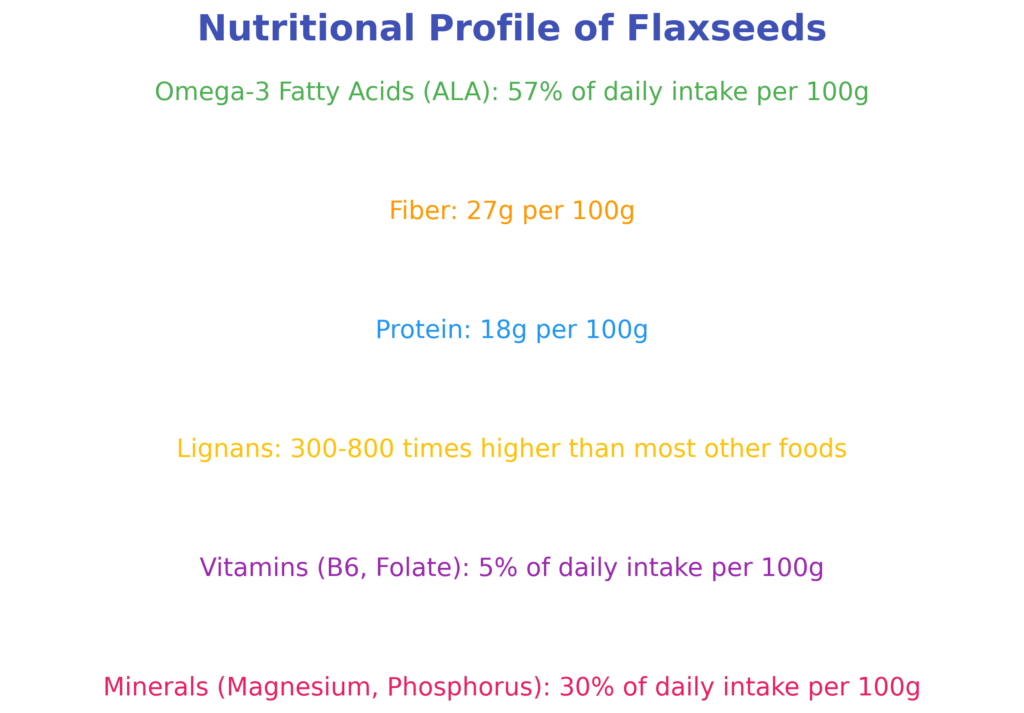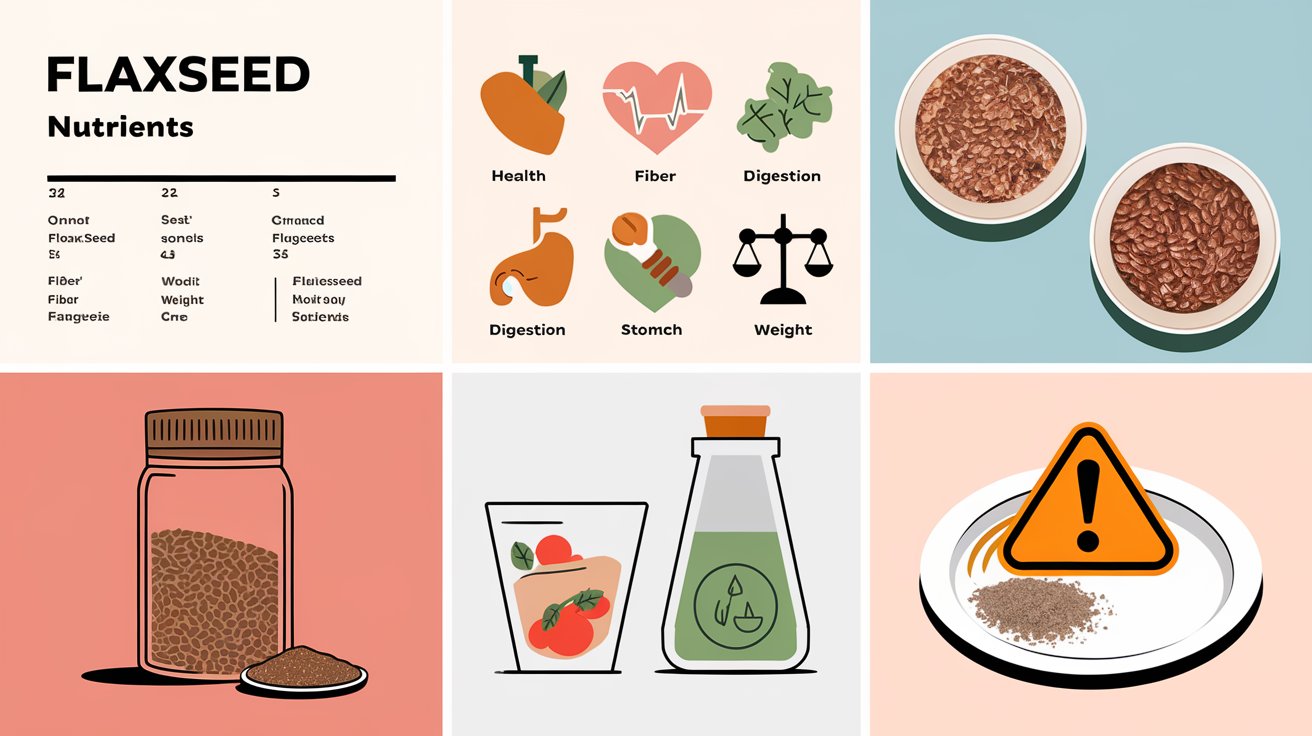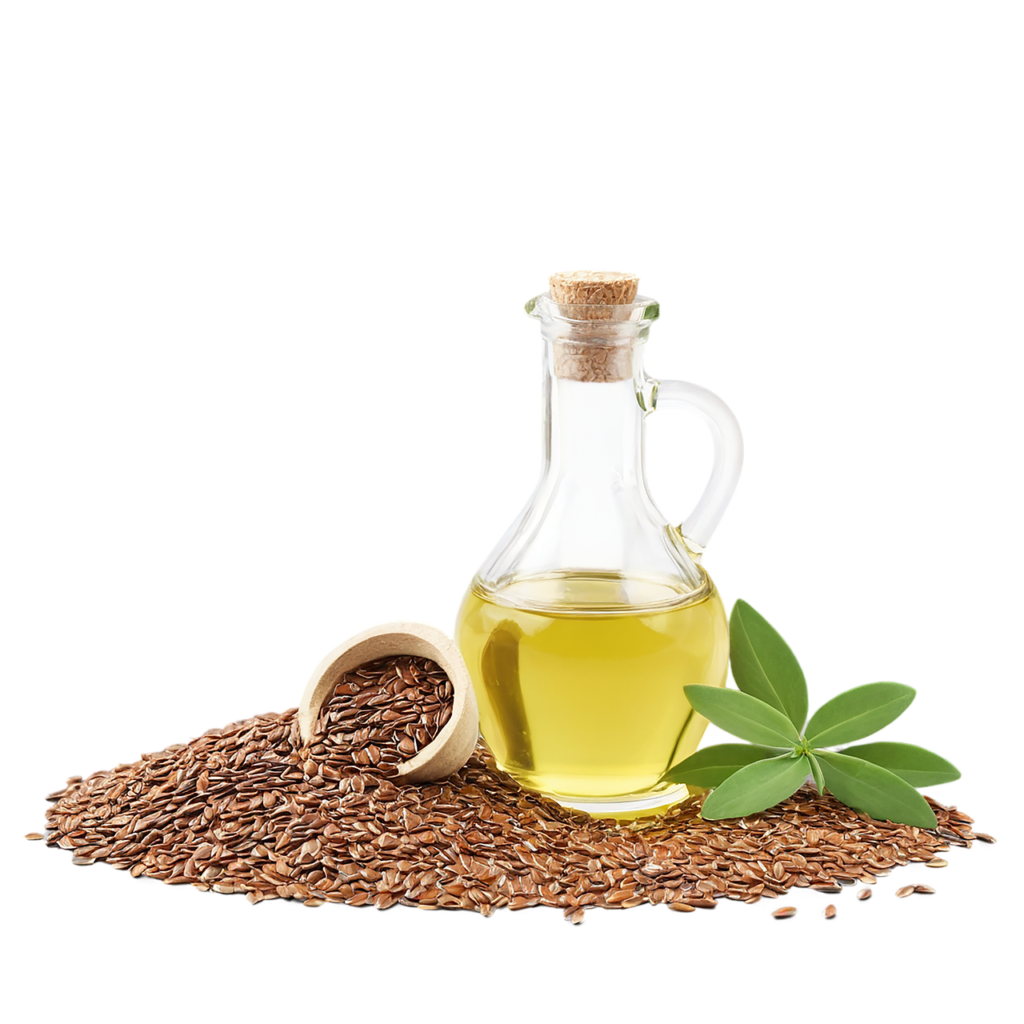Table of Contents
ToggleIntroduction
Flaxseeds, often called a “superfood,” have been consumed for thousands of years due to their impressive health benefits. These tiny seeds pack a big punch when it comes to nutrition, with high levels of essential fatty acids, fiber, and antioxidants. This article dives deep into the nutritional profile, health benefits, and practical ways to incorporate flaxseeds into your daily diet to fully experience the power of this nutritional superfood.
Nutritional Profile of Flaxseeds
Flaxseeds are loaded with nutrients that contribute to overall health. Here’s a look at what makes them a powerhouse:
Omega-3 Fatty Acids: Flaxseeds are one of the richest plant sources of alpha-linolenic acid (ALA), an omega-3 fatty acid essential for heart and brain health.
Fiber: Both soluble and insoluble fiber are present in flaxseeds, aiding digestion and supporting gut health.
Protein: Each tablespoon of flaxseeds provides around 2 grams of protein, making it a valuable addition for those seeking plant-based protein sources.
Lignans: Flaxseeds contain lignans, plant compounds that have antioxidant properties and may reduce cancer risk.
Vitamins & Minerals: Flaxseeds are a good source of B vitamins, particularly folate and B6, as well as minerals like magnesium, manganese, and phosphorus.

Health Benefits of Flaxseeds
Flaxseeds are a nutritional powerhouse, offering a wide range of health benefits. Packed with essential nutrients like omega-3 fatty acids, fiber, and lignans, flaxseeds support heart health, promote digestive wellness, aid in weight management, and help regulate blood sugar levels. Additionally, the antioxidants found in flaxseeds may play a role in cancer prevention, particularly in hormone-related cancers like breast cancer. Incorporating flaxseeds into your diet can provide a natural and effective way to enhance overall well-being. Below are some key health benefits of flaxseeds.
Heart Health
Flaxseeds are well-regarded for their heart health benefits due to their high omega-3 content. Omega-3s help reduce inflammation, lower blood pressure, and maintain a healthy cholesterol balance, potentially reducing the risk of heart disease.
Digestive Health
The fiber in flaxseeds promotes regular bowel movements and acts as a prebiotic, feeding beneficial gut bacteria. This supports overall digestive health and can help prevent constipation.
Weight Management
Flaxseeds can be helpful for weight management. The fiber expands in the stomach, creating a sense of fullness and helping to reduce overeating.
Flaxseeds are packed with nutrients, offering a range of health benefits such as improved digestion, heart health support, and even potential weight management benefits. But flaxseeds aren’t the only natural remedy with powerful health properties.
If you’re looking to explore other plant-based health boosters, check out our article on the benefits of okra water. Okra water is rich in antioxidants and essential vitamins, providing unique support for overall wellness
Blood Sugar Regulation
The fiber and healthy fats in flaxseeds help slow the release of sugar into the bloodstream, which can be beneficial for blood sugar control. This makes flaxseeds an excellent choice for those managing diabetes or at risk of developing it.
Potential Cancer Prevention
The lignans in flaxseeds have antioxidant properties that may reduce cancer risk, particularly breast cancer. Lignans are phytoestrogens, plant compounds that can balance hormone levels and may help prevent certain hormone-related cancers.
Flaxseeds are incredibly versatile and can be easily incorporated into your daily diet in various forms. Whether you’re looking to boost your omega-3 intake, improve digestion, or enhance the nutritional profile of your meals, there are many ways to enjoy flaxseeds. Here are some popular methods for consuming flaxseeds and making the most of their health benefits:

Top 5 Ways to Consume Flaxseeds for Better Health
Flaxseeds are incredibly versatile and can be easily incorporated into your daily diet in various forms. Whether you’re looking to boost your omega-3 intake, improve digestion, or enhance the nutritional profile of your meals, there are many ways to enjoy flaxseeds. Here are some popular methods for consuming flaxseeds and making the most of their health benefits:
Whole vs. Ground Flaxseeds
While whole flaxseeds have a longer shelf life, they are harder to digest, and most of their nutrients remain locked within the hard outer shell. Ground flaxseeds are easier for the body to absorb, so grinding them is generally recommended.
Adding Flaxseeds to Smoothies
One of the easiest ways to incorporate flaxseeds into your diet is by adding a tablespoon to your favorite smoothie. Their mild flavor won’t interfere with the taste, and you’ll get an extra boost of fiber and omega-3s.
Baking with Flaxseeds
Flaxseeds are excellent for baking, and they can even replace eggs in recipes. To make a “flax egg,” mix one tablespoon of ground flaxseed with three tablespoons of water, let it sit for a few minutes, and then use it as an egg substitute.
Sprinkling on Salads and Cereals
Ground flaxseeds make a great addition to salads, oatmeal, yogurt, and even soups. Sprinkle a teaspoon or two to increase the nutritional profile of your meals.
Flaxseed Oil
Flaxseed oil is a potent source of omega-3s, though it lacks the fiber found in whole seeds. Use it as a dressing or drizzle it over cooked vegetables to add healthy fats without needing to heat the oil.

The Ultimate Guide to Buying and Storing Flaxseeds
- Choose Whole or Ground: If you prefer buying whole flaxseeds, grind them in small batches as needed to keep them fresh. Ground flaxseeds can go rancid quickly due to their fat content.
- Store in an Airtight Container: Flaxseeds should be stored in a dark, airtight container to maintain their nutritional value. Ground flaxseeds are best stored in the refrigerator.
- Check the Expiration Date: If buying pre-ground flaxseeds, ensure the expiration date is a few months away for maximum freshness.

Potential Side Effects and Considerations
While flaxseeds are generally safe for most people, there are a few things to keep in mind:
Digestive Issues
Flaxseeds are high in fiber, which can be very beneficial for digestive health. However, consuming too many flaxseeds, especially if your body is not used to a high-fiber diet, can lead to digestive discomfort such as bloating, gas, or even diarrhea. The fiber in flaxseeds, both soluble and insoluble, can absorb water and expand in the digestive system, which may cause bloating or a feeling of fullness if eaten in excess. To avoid these issues, it’s recommended to start with small amounts—such as one teaspoon of ground flaxseeds per day—and gradually increase your intake over time to allow your digestive system to adjust.
Interaction with Medications
Flaxseeds contain compounds that may interact with certain medications, particularly blood-thinning drugs (like warfarin or aspirin) and hormone-sensitive medications (such as those used for breast cancer treatment or birth control). The omega-3 fatty acids in flaxseeds have mild blood-thinning effects, which can potentially enhance the effects of anticoagulant medications and increase the risk of bleeding. Flaxseeds are also rich in lignans, which are plant-based compounds that act similarly to estrogen in the body. This could interfere with hormone-sensitive medications. If you’re taking these types of medications, it’s essential to consult with your healthcare provider before adding significant amounts of flaxseeds to your diet to avoid any adverse interactions.
Pregnancy and Breastfeeding
Flaxseeds are generally considered safe for most people, but there are some considerations for pregnant and breastfeeding women. Due to the phytoestrogen content in flaxseeds, some experts recommend caution, particularly in large amounts, as these compounds can mimic estrogen in the body and might affect hormone levels. Although there is no clear evidence that flaxseeds are harmful during pregnancy or breastfeeding when consumed in moderate amounts, It is important to consult with a healthcare provider before adding any new food or supplement to your diet during pregnancy or breastfeeding. They can offer personalized advice based on your specific health needs and situation. It’s always best to consult a healthcare provider before introducing any new food or supplement into your diet during pregnancy or lactation. They can provide personalized guidance based on your individual health needs and circumstances.
By being mindful of these considerations and consulting with a healthcare provider when necessary, you can safely enjoy the numerous health benefits of flaxseeds while avoiding potential side effects.
Conclusion
Flaxseeds are a nutrient-packed superfood that can easily be incorporated into any diet. Rich in omega-3 fatty acids, fiber, and plant-based protein, flaxseeds offer a wide range of health benefits, including improved heart health, enhanced digestion, and better blood sugar regulation. Whether you’re seeking to boost your overall nutrition or manage specific health concerns, adding flaxseeds to your daily routine is a simple and effective way to support your well-being. Start with just a tablespoon a day and experience the powerful benefits these tiny seeds provide!





Pingback: 5 Easy Smoothie Recipes for Boosting Energy - Totalwellbeingblog.com
Pingback: 5 Easy Vegan Recipes for a Healthy and Sustainable Lifestyle - Totalwellbeingblog.com
Pingback: 7-Day Low-Carb Meal Plan: Simple, Healthy, and Delicious Recipes for Every Day - Totalwellbeingblog.com